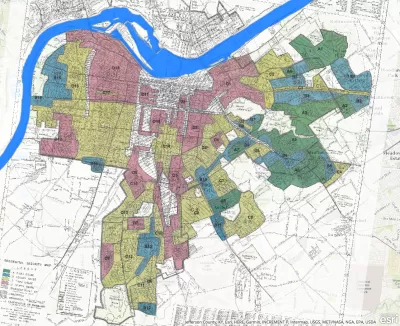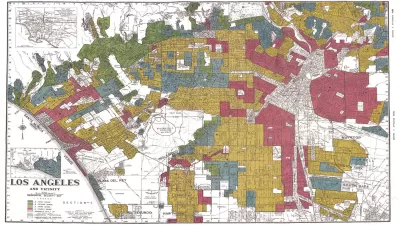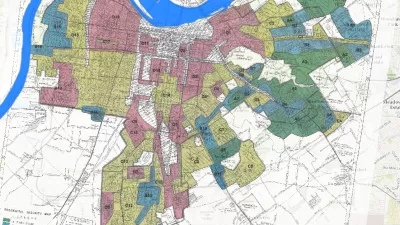The Innovations in Government Program at the Harvard Kennedy School’s Ash Center for Democratic Governance and Innovation has announced the first winner of the "Map of the Month" contest.

Eric Bosco announces the winner of Harvard University's first "Map of the Month" contest. The winning map, called "Redlining Louisville: The History of Race, Class, and Real Estate," was created by the Louisville Office of Redevelopment Strategies to coordinate with a year-long series of public events "to promote community dialogue on the issue of redlining," reports Bosco. (Redlining, as defined by Bosco, is "the denial of services or the refusal to grant loans or insurance to certain neighborhoods based on racial and socioeconomic discrimination.")
According to the history revealed by the map, redlining came to Louisville 80 years ago, and the problem persists to this day, with what Jeana Dunlap, director of redevelopment strategies in Louisville, calls "digital redlining tendencies," with access to broadband internet, health and medical services, and grocery stores.
"The map combines a variety of datasets — vacant properties, building permits, and property values — and includes the original 1937 HOLC Louisville residential security assessment map indicating neighborhood desirability for investment that illustrates the historic redlining. Users can compare HOLC data with current census tract data by property values, race, vacant properties, and home ownership locations," writes Bosco.
The Map of the Month contest recognizes the best data visualizations created by all levels of government and nonprofits, according to Bosco.
FULL STORY: Map of the Month: Redlining Louisville

Alabama: Trump Terminates Settlements for Black Communities Harmed By Raw Sewage
Trump deemed the landmark civil rights agreement “illegal DEI and environmental justice policy.”

Planetizen Federal Action Tracker
A weekly monitor of how Trump’s orders and actions are impacting planners and planning in America.

The 120 Year Old Tiny Home Villages That Sheltered San Francisco’s Earthquake Refugees
More than a century ago, San Francisco mobilized to house thousands of residents displaced by the 1906 earthquake. Could their strategy offer a model for the present?

In Both Crashes and Crime, Public Transportation is Far Safer than Driving
Contrary to popular assumptions, public transportation has far lower crash and crime rates than automobile travel. For safer communities, improve and encourage transit travel.

Report: Zoning Reforms Should Complement Nashville’s Ambitious Transit Plan
Without reform, restrictive zoning codes will limit the impact of the city’s planned transit expansion and could exclude some of the residents who depend on transit the most.

Judge Orders Release of Frozen IRA, IIJA Funding
The decision is a victory for environmental groups who charged that freezing funds for critical infrastructure and disaster response programs caused “real and irreparable harm” to communities.
Urban Design for Planners 1: Software Tools
This six-course series explores essential urban design concepts using open source software and equips planners with the tools they need to participate fully in the urban design process.
Planning for Universal Design
Learn the tools for implementing Universal Design in planning regulations.
Clanton & Associates, Inc.
Jessamine County Fiscal Court
Institute for Housing and Urban Development Studies (IHS)
City of Grandview
Harvard GSD Executive Education
Toledo-Lucas County Plan Commissions
Salt Lake City
NYU Wagner Graduate School of Public Service





























